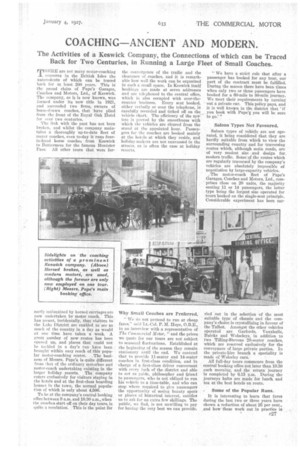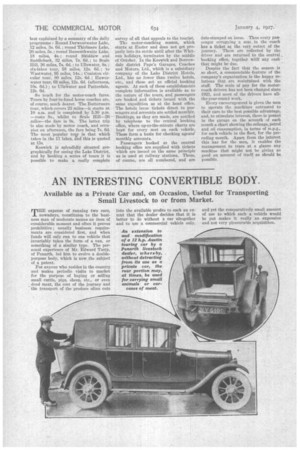COACHING-ANCIENT AND MODERN.
Page 49

Page 50

If you've noticed an error in this article please click here to report it so we can fix it.
The Activities of a Keswick Company, the Connections of which can be Traced Back for Two Centuries, in Running a Large Fleet of Small Coaches.
TNRE are not many motor-coaching -L coacerns in the British Isles the antecedents of which can be traced back for at least 200 years. This is the proud claim of Pape's Garages, Coaches and Motors, Ltd., of Keswick. The company, as it is now known, was formed under its new title in 1921, and succeeded two firms, owners of horse-drasvn coaches, that have plied from the front of the Royal Oak Hotel snr over two centuries.
The link with 'the past has not been broken, and 'Mina the company maintains a thoroughly up-to-date fleet of motor coaches, even to-day it runs fourin-hand horse coaches from Keswick to Buttermere for the famous Honister Pass. All other tours that were for
merly maintained by horsed carriages are DOW undertaken by motor coach. This has meant, incidentally, that visitors to the Lake District are enabled to 'see as umeh of the country in a day as would at one time have taken a week. A great number of new routes has been opened up, and places that could not be tackled in a day's run have been brought within easy reach of this popu
lar motor-coaching centre. The business of Messrs. Pape's is.quite different from that of the ordinary motorbus and motor-coach undertaking existing in the larger holiday resorts. The company eaters exclusively for visitors staying in the hotels and at the first-class boarding houses in the town, the normal population of which is only about 4,500.
To be at the company's central booking office between 9 a.m. and 10.30 a.m., when the conches start off en their day tours, is quite a revelation. This is the point for the convergence of the traffic and the clearanee of coaches, and it is remarkable how well the work can be organized in such a small space. In Keswick itself bookings are made at seven addresses aud are telephoned to the central office, which is also occupied with over-thecounter business. Every scat booked, either verbally or over the telephone, is carefully recorded and ticked off on the vehicle chart. The efficiency of the system is proved by the smoothness with which the vehicles are cleared from the stand at the appointed hour. Passengers for the coaches are booked mainly at the hotels at which they reside, and holiday-makers are not canvassed in the streets, as is often the case at holiday resorts.
Why Small Coaches are Preferred.
" We do not pretend to run at cheap fares," said Lt.-Col. P.M. Hope, 0.B.E., in an interview with a representative of Tlie Commercial Motor, " and the prices we quote for our tours are not subject to seasonal fluctuations. Established at the beginning of the season they remain stationary until the end. We contend that to provide 11-seater and 14-seater coaches in first-class cendition, and in charge of a first-class driver conversant with every inch of the district and able to act as guide, philosopher and friend to passengers, who is not obliged to run his vehicle to a time-table, and who can Stop where required to give passengers the opportunity of seeing beauty spots or places of historical interest, entitles us to ask for an extra few shillings. The public, we find, is not unwilling to pay for having the very best we can provide.
" We have a strict rule that after a passenger has booked for any tour, our part of the contract must be fulfilled. During the season there have been times when only two or three passengers have hooked for a GO-mile to 80-mile journey. We meet their requirements by turning out a private car. This policy pays, and it is well known in the district that 'if you book with Pape' d you will be sure to go.'" Saloon Types Not Favoured.
Saloon types of vehicle are not operated, it being considered that they are hardly suitable from which to view the surrounding country and for traversing routes which, although main roads, are of very modest size and design for_ modern traffic. Some qf the routes which are regularly traversed by the company's vehicles are absolutely impossible of negotiation by large-capacity vehicles.
, The motor-coach fleet of Pape's Garages, Coaches and Motors, Ltd., comprises close on 20 units, the majority seating 11 or 14 passengers, the latter type being the largest size operated for tours booked on the single-seat principle. Considerable experiment has been car ried out in the selection of the most suitable type of chassis and the company's choice is crystallizing in favour of the Talbot. Amongst the other vehicles operated are Garfords, Vauxhalls, Buieks and Wolseleys, in addition to two Tilling-Stevens 28-seater coaches, which are reserved exclusively for the conveyance of large private parties. In the private-hire branch a speciality is made of WoIseley cars.
All full-day tours commence from the central booking office not later than 10.30 each morning, and the return journey is completed by 6.10 p.m. During the journeys halts are made for lunch, and tea at the best hotels en route.
Some of the Popular Runs.
It is interesting to learn that fares during the last two or three years have shown a reduction of about 25 per cent., and how these work out in practice is
best explained by a summery of the daily programme: Round Derwentwater Lake, 12 miles, 3s. 6d.; round Thirlmere Lake, 20 miles, 5s.; round Bassenthwaite Lake, 18 miles, 4s. ; round Skiddaw and Saddleback, 32 miles, 7s. Od.; to Scale Hill, 26 miles, 7s. ; to Ullswater, Ss.; six-lakes tour, 58 miles, 12s. 6d.; to Wastwater, 95 miles, 14s.; Coniston circular tour, 80 miles, 12s. 6d. ; Haweswater tour, 68 miles, 12s. 6d. (afternoon, 10s. 6d.) ; to Ullnater and Patterdale, 12s. 6d.
So much for the motor-coach fares. Tours by four-in-hand horse coaches are, of course, much dearer. The Buttermere tour, which covers 22 miles—it starts at 10 a.m. and is completed by 5.30 p.m. —costs 8s., whilst to Scale Hill-26 miles—the fare is 9s. The latter trip is also made by motor coach, and wellpies an afternoon, the fare being 7s. 611. The most popular tor is that which takes in the 11 lakes, and this is quoted at 15s.
Keswick is splendidly situated geographically for seeing the Lake District, and by booking a series of tours it is possible to make a really complete
survey of all that appeals to the tourist.
The motor-coaching season, which starts at Easter and does not get properly into its stride until after the Whitsun holidays, terminates by the middle of October. In the Keswick and Borrowdale district Pape's Garages, Coaches and Motors, Ltd., which is a subsidiary company of the Lake District Hotels, Ltd., his no fewer than twelve hotels, etc., and these act as official booking agents. At each of these establishments complete information is available as to the nature of the tours, and passengers are booked and tickets issued with the same expedition as at the head office. The hotels issue tickets direct to passengers aud accounts are settled monthly. Bookings, as they are made, are notified by telephone to the central booking office, where up-to-the-minute charts are kept for every seat on each vehicle. These form a basis for checking agents' monthly accounts.
Passengers booked at the central booking office are supplied with tickets which are issued on the same principle as is used at railway stations. These, of course, are all numbered, and are date-stamped on issue. Thus every passenger occupying a seat, in the coach has a ticket at the very outset of the journey. These are collected by the driver and are returned to the central booking office, together with any cash that might be due.
Despite the fact that the season is so short, a commendable feature of the company's organization is the happy relations that are maintained with the staff. The scale of pay for the motorcoach drivers has not been changed since 1921, and mast of the drivers have allthe-year-round work.
Every encouragement is given the men to operate the machines entrusted to their care to the best possible advantage, and, to stimulate interest, there is posted in the garage on the seventh of each month a chart showing the mileage, petrol and oil consumption, in terms of m.p.g., for each vehicle in the fleet, for the preceding month. Apart from the interest this has for the men, it enables the management to trace at a glance any machine that might not be giving as good an account of itself as should be possible.












































































































